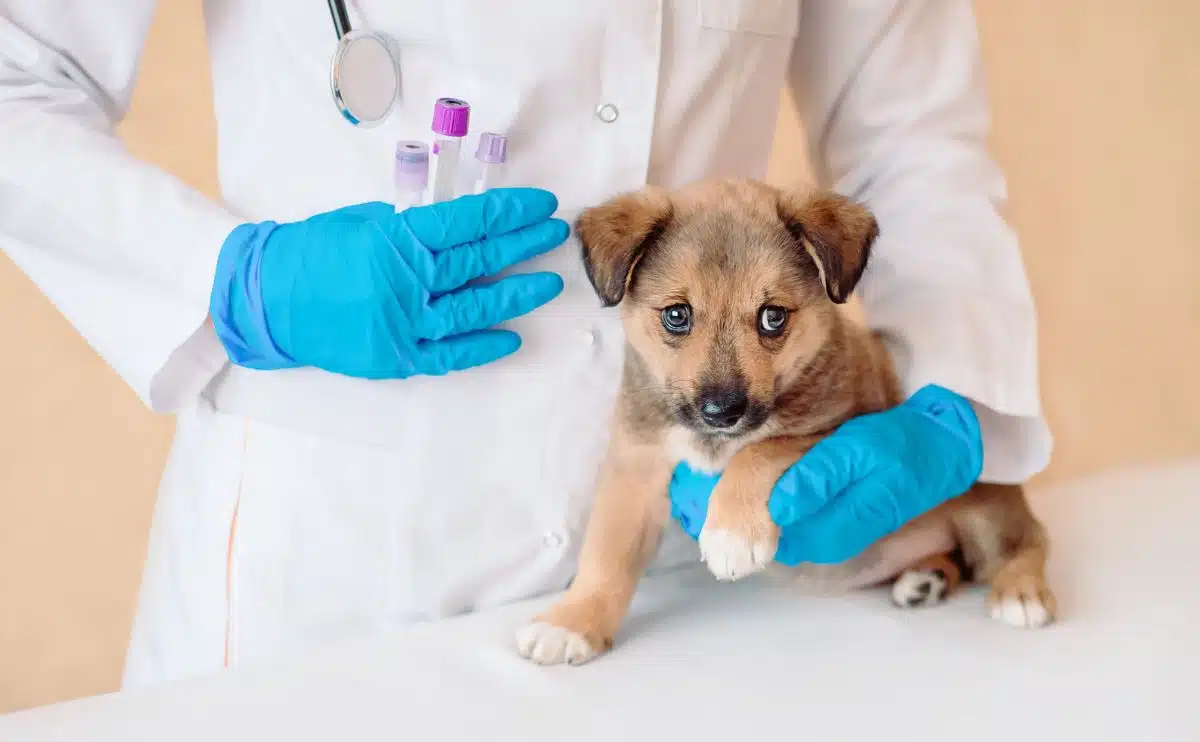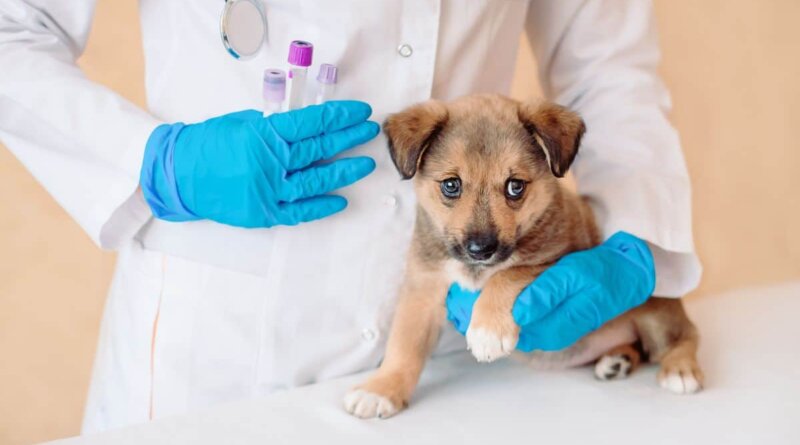How Puppies Get Worms, Symptoms, Prevention, Treatment & More
To keep the lights on, we receive affiliate commissions via some of our links. Our review process.

Welcoming home a new furry member of the family is an exciting time. However, intestinal parasites and worms are common in young dogs, and nobody wants extra visitors to their family. Worming is an important part of responsible pet ownership, as worms can pose a health risk to your pet and your family. So how do you spot, treat, and prevent worms in puppies?
What Are Worms?
Worms are common parasites in dogs and tend to live in the intestines and respiratory systems. Every puppy is susceptible to worms. Some species are passed from their mother through their milk or placenta, whereas others are ingested from the environment.
4 Common Types Of Intestinal Worms In Dogs:
- Roundworm. The most common species of roundworm that affect dogs are Toxocara canis and Tocascaris leonin. Both are long, white, and spaghetti-like in appearance. They initially infect a dog’s intestinal tract but can burrow into other organs in the body, including the lungs. Both can pose a threat to human health as well as to your dog.
- Hookworm. These are blood-sucking parasites with teeth. Infection in young puppies can be fatal, resulting in anemia and blood loss.
- Whipworm. Whipworms live in the large intestine in dogs and pose fewer problems unless they burrow into the intestinal tissue.
- Tapeworm. These are long (up to half a meter in length) and flat in appearance. They absorb nutrients from the dog. When excreted, the worm splits into segments that can look like grains of rice in your dog’s poo.
Other Types Of Worms
In addition to intestinal worms, dogs can contract more serious types of parasites that live in the heart and lungs.
- Heartworm. This is a blood-borne parasite (Dirofilaria immitis) that is found in the heart and large blood vessels of dogs. The worms can live in adult dogs for up to 5 years, and infections cause serious health problems. Heartworm is spread by mosquito bites.
- Lungworm. These travel around your dog’s body through its blood vessels and affect the heart, lungs, and other organs. Infection can cause bleeding disorders which, if left untreated, can be fatal in severe cases. Dogs contract lungworms by eating larvae found in infected snails, slugs, or frogs.
How Do Puppies Get Worms?
Puppies are particularly susceptible to worms as their inquisitive nature leads them to sniff or eat most things they come across. Puppies can contract worms from their mother’s milk or the placenta before birth. They are also susceptible to ingesting worm eggs and larvae from their environment. Worm eggs and larvae are shed by adult dogs in their feces, found in the soil, and intermediate hosts such as certain bugs, insects, and wildlife. Grooming and swallowing fleas carrying the infective stage of tapeworms can also lead to infection.
What Are The Symptoms Of Worms In Puppies?
Symptoms of intestinal worms in puppies include loss of appetite, diarrhea or loose stools, vomiting, poor growth, a dull coat, and failure to thrive. Tapeworms may cause irritation to the anus and cause scooting (dragging their bottom across the ground). If puppies have a heavy infection of worms, their belly can appear swollen or ‘pot-bellied’.
Hookworms in puppies can be very serious, leading to blood loss and anemia. Puppies can become unwell very quickly with pale gums, lethargy, and weakness. If your puppy is unwell and you suspect a worm infestation, then seek urgent veterinary care.
Lungworm and heartworm affect adult dogs more commonly than puppies. However, any age dog can be affected. Symptoms include coughing, reduced ability to exercise, collapse, and bleeding from the mouth, nose, or excessive bruising on the skin.
The good news is that common worms are easily controlled with a reliable deworming schedule, preventing severe infection and illness caused by these parasites. Prevention is always better than cure.
How To Deworm A Puppy
Most worming treatments are easy and effective to use. These treatments do not prevent your pet from contracting worms but work by killing any worms that are present, therefore preventing large worm burdens that can cause illness.
There are many different worming products on the market that target different types of worms. Deworming treatment can be administered as a liquid, tablet, or powder that is given orally or as a topical spot-on treatment that is absorbed through the skin. Your veterinarian will be able to advise which products are most effective based on your dog’s lifestyle, the risk in the area you live in, and the age of your dog.
For example, dogs that live in warmer climates and are exposed to mosquitos are at risk of heartworm, whereas dogs that live in cooler, wetter climates are more at risk of lungworm.
If your puppy is refusing to take the deworming medication, try wedging it in their favorite treat or coating the tablet in peanut butter – who could resist that?
When To Deworm Puppies
Deworming schedules for puppies vary depending on their age, the country they live in, and what deworming medication their mom has received. All puppies should receive regular deworming treatment to help keep them, your house, and your family healthy.
Check with the breeder or rescue center where you rehomed your puppy, how often they wormed your pup, and when the last dose was. Deworming treatment should start from birth. If you have other pets in the house, the timing of medications can get confusing, so a dog deworming schedule chart is a good idea so that doses don’t get missed or forgotten.
How Many Dewormings Does A Puppy Need?
Your veterinarian will be able to advise on a suitable deworming schedule for your puppy based on its size, weight, and risk factors. The frequency at which worming medications are given to puppies varies depending on the product and type of worm they are aiming to kill.
As a general rule, puppies should be wormed every 2 weeks from birth until they are 12 weeks of age. After 12 weeks of age, puppies and adults should receive worming treatment every three months. Medications for lungworm and heartworm may need to be given monthly, depending on the product and level of risk to your dog.
How Can I Prevent My Puppy From Getting Worms?
The best prevention from parasites is to use a regular, effective worming treatment that has been prescribed by your vet. Ensuring all animals in the house (cats and dogs) have regular worming treatment is essential – there is little value in just treating the puppy as they will become re-infected quickly.
Puppies can become re-infected from their environment, so ensuring that feces are cleaned up regularly, and their environment is clean is essential. Fleas are a common cause of worms in puppies, so it is important to ensure that all pets in your house are regularly checked and treated for flea infestations.
Home Remedies For Worms In Puppies
There are many suggestions for ‘natural’ products to treat worms in dogs, from turmeric, and apple cider vinegar, to plants and vegetation. Unfortunately, home remedies are very unlikely to work and will not kill the range of parasites that dogs are affected by. To treat worms, you need a product with proven ingredients. Your veterinarian will be able to prescribe the most effective deworming schedule for your furry family.
What Are The Risks To Humans From Worms In Puppies?
Providing deworming treatment to your furry members of the family is important to protect your health and that of your family. Worm-related diseases can pose a risk to humans, although thankfully, these diseases are rare. Roundworm eggs are microscopic and can be picked up on the hands of children playing in soil and sandpits. These worms develop in the intestine and migrate to other organs in the body, including the liver, heart, brain, and eyes.
If you are concerned about roundworm infection in your family, then seek medical advice. The risk of infection is reduced by promptly disposing of your puppy’s poo safely, not letting your puppy defecate near play areas or vegetable patches, and washing your hands thoroughly after handling your puppy, especially if you have handled its waste.
Ways To Prepare For Puppyhood
As you welcome your new puppy into your house, there can be a lot to remember. Keeping them happy and healthy is our top priority, and this extends to getting rid of any unwanted parasites. It is important to treat your puppy for worms during the early stages of their life and maintain this treatment into their adult years. If you have concerns about worm infections in your puppy or need advice on the best treatment to use, then contact your vet. Learn more about welcoming a new puppy into your life with this puppy checklist, and learn about all the shots they’ll need in this puppy vaccination schedule.
Tagged With: Vaccinations, Worms




